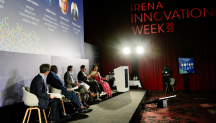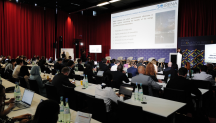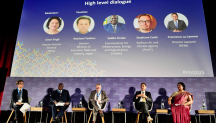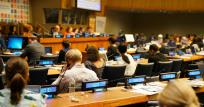
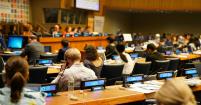
Sustainable, Modern Energy Dominates Discussion at UN Forum
Newsletter
High-Level Political Forum reaffirms renewable energy’s central role in achieving global sustainable development goals
"#SDG7 is a path of opportunity. We must scale-up efforts to maximise the socio-economic & environmental benefits of a global energy transformation and ensure a sustainable energy future that leaves no one behind"—@AdnanZAmin sets the scene & moderates #HLPF2018's SDG7 session pic.twitter.com/5Bot58q5aq
— IRENA (@IRENA) July 10, 2018
"Taking a long-term view on infrastructure investment & averaging distribution costs across the country, has made access to modern energy possible, affordable & sustainable"—Siri Jirapongphan, #Thailand's Min.of Energy says on #SDG7 advancing policies & practices, at #HLPF2018 pic.twitter.com/RprfcsBu1y
— IRENA (@IRENA) July 10, 2018
Addressing hundreds of delegates in a well-attended conference room at the United Nations on 10 July 2018, IRENA Director-General Mr. Adnan Z. Amin moderated the High-Level Political Forum session on the progress made in implementing SDG 7 – the Sustainable Development Goal aimed at ensuring access to affordable, reliable, sustainable and modern energy for all.
Mr. Amin told the High-Level Political Forum on Sustainable Development that the adoption of SDG 7 was the first-ever global goal on energy and is ground-breaking in that it places energy at the core of the international sustainable development agenda. Encouraging UN Members to be ambitious, to cooperate, and to act to seize the socio-economic and environmental benefits that can be attained through sustainable energy, including renewables, Mr. Amin called on a high-level panel to share their views on the progress being made to achieve SDG7.
Assessing progress
Thailand’s Minister of Energy, Mr. Siri Jirapongphan, outlined how his country is spearheading renewable energy deployment in South-East Asia and has recently increased its renewable energy target to 30% by 2036. He described Thailand's efforts to make energy access affordable for the poor, and emphasized the need to place affordability as a core principle — achieved by applying technological innovations and system integration to increase efficiency and reliability, and drive down costs.
Ms. Laurence Tubiana, CEO of the European Climate Foundation, argued that striving to achieve SDG7 would help to achieve the global climate goals and vice versa – that these two aims strengthen one another. She urged countries to be more imaginative, look to the long term, and involve communities in energy planning.
Ms. Sheila Oparaocha, Executive Director of ENERGIA, focused on the inter-linkages between SDG 7 and SDG 5 – the sustainable development goal that strives to achieve gender equality and empowerment of all women and girls. She explained how failing to meet cooking energy targets would disproportionately affect women and that a broader perspective on energy needs to look at whole value chain. Ms. Oparaocha reminded the Forum that that the clock is ticking, that there are only 12 years more years to achieve SDG 7 in time, and that greater focus needs to be placed on those without energy.
‘Realising #SDG7 is in reality part of the implementation of the #ParisAgreement. At the same time the Paris Agreement can give greater ambition to SDG7’—@LaurenceTubiana at #HLPF2018. #Renewables4Climate & #Renewables4Development pic.twitter.com/X7BIXDX5ES
— IRENA (@IRENA) July 10, 2018
‘Working on the energy transition and gender equality is not only good for business, it’s good for meeting our goal of leaving no one behind’—@energia_org’s Sheila Oparaocha at the #SDG7 Implementation session at #HLPF2018. Watch the stream: https://t.co/ogB0bt7FVB pic.twitter.com/1vfEdGRmHI
— IRENA (@IRENA) July 10, 2018
At #HLPF2018's SDG7 Implementation review @HIbrekk highlights 3 recommendations to realise #SDG7, identified by its Technical Advisory Group —1) Make clean cooking a top priority, 2) Scale-up financing for energy efficiency & 3) Crowd in private sector finance pic.twitter.com/VZdKx8aKLi
— IRENA (@IRENA) July 10, 2018
The World Bank’s Senior Director of Energy and Extractive Industries Global Practice, Riccardo Puliti, echoed IRENA’s message that the business case for renewable energy is growing stronger. Mr. Puliti argued that legal frameworks and stable policies are key to achieving SDG 7. He concluded that predictability is what the private sector is looking for when choosing where to invest and that regional integration increases predictability, allows better choices, and attracts more private sector investment.
Accelerating a positive momentum
Discussants during the review, Mr. Hans Olav Ibrekk, Policy Director, Energy and Climate Change at the Norwegian Ministry of Foreign Affairs; Ms. Mengrong Cheng, President of State Grid Corporation of China U.S. Representative Office and GEIDCO US Representative ad interim; and Ms. Joan Carling, co-convenor of TEBTEBBA (Indigenous Peoples Major Group), shared their perspectives on SDG 7 implementation.
Mr. Ibrekk listed three priorities identified by the SDG 7 Technical Advisory Group, of which he is a Co-Facilitator. Those priorities being: Make clean cooking solution a top priority; scale-up financing for energy efficiency; and focus on domestic resource mobilization, including developing national institutions, small and medium enterprises, and local currency lending, which is crucial to support the energy transformation in countries currently not attracting financing.
Ms. Cheng underscored the importance of infrastructure and interconnections in achieving sustainable, modern energy for all. Ms. Carling emphasized the importance of putting communities at the centre of renewable energy planning and involving them in decision making.
Interventions from UN Members, described countries’ efforts to address SDG 7 as well as calls for further action, including the need for greater involvement with the youth and those most affected by no-to-limited access to energy. Several Members also reiterated the importance of the inter-linkages between SDG 7 and global climate goals.
IRENA’s Director-General closed the session concluding that SDG 7 provides a compelling platform for the United Nations and its Member States to ratchet up the positive momentum of the ongoing energy transformation.
Watch a recording of the session on the UN TV website or below.

